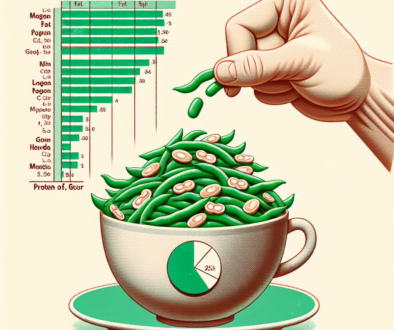Do Green Beans Make You Gassy?
Table of Contents
- Green Beans and Digestion: Do They Cause Gas?
- Understanding the Digestive Process
- Green Beans: Nutritional Profile and Components
- Why Green Beans May Cause Gas
- Individual Differences in Digestion
- How to Reduce Gas from Green Beans
- Health Benefits of Green Beans
- Conclusion: Balancing Nutrition and Digestive Comfort
- ETprotein: Enhance Your Diet with High-Quality Protein Products
Green Beans and Digestion: Do They Cause Gas?

Green beans, a common vegetable on dinner plates across the globe, are known for their nutritional benefits and versatility in various cuisines. However, many people wonder whether consuming green beans can lead to an uncomfortable side effect: increased gas. This article delves into the digestive implications of eating green beans, backed by scientific research and expert opinions.
Understanding the Digestive Process
Before we address the specific effects of green beans on digestion, it’s important to understand the general process of how our bodies break down food. Digestion involves a complex series of chemical reactions and microbial activities that break down food into absorbable nutrients. Carbohydrates, proteins, and fats are processed differently, and the byproducts of this digestion can sometimes include gas.
Green Beans: Nutritional Profile and Components
Green beans, also known as string beans or snap beans, are a rich source of vitamins, minerals, and dietary fiber. They contain vitamin C, vitamin K, vitamin A, manganese, folate, and fiber. The fiber content in green beans is particularly noteworthy because it plays a significant role in digestive health.
- Dietary Fiber: Green beans are high in dietary fiber, which is essential for healthy digestion. However, fiber can also be a double-edged sword when it comes to gas production.
- Complex Carbohydrates: Green beans contain complex carbohydrates like oligosaccharides, which can be more challenging for some people to digest.
Why Green Beans May Cause Gas
The primary reason green beans can cause gas is due to their fiber content. Dietary fiber is not fully broken down by the enzymes in the human digestive tract but is instead fermented by bacteria in the large intestine. This fermentation process produces various gases, including hydrogen, carbon dioxide, and sometimes methane.
Green beans contain specific types of sugars called oligosaccharides, which include raffinose and stachyose. These sugars are part of a group known as FODMAPs (Fermentable Oligo-, Di-, Mono-saccharides And Polyols), which are known to cause digestive discomfort in some individuals, particularly those with irritable bowel syndrome (IBS).
Individual Differences in Digestion
It’s important to note that not everyone will experience gas after eating green beans. Individual differences in gut microbiota composition mean that some people can digest oligosaccharides more efficiently than others. Additionally, regular consumption of high-fiber foods can lead to adaptations in the gut flora, potentially reducing gas production over time.
How to Reduce Gas from Green Beans
If you find that green beans cause you gas but you don’t want to eliminate them from your diet, there are several strategies you can employ to minimize discomfort:
- Soaking and Cooking: If you’re eating dried beans, soaking them before cooking can help reduce oligosaccharides. While this doesn’t apply to fresh green beans, cooking them thoroughly can aid in digestion.
- Portion Control: Eating smaller amounts of green beans at a time can lessen the load on your digestive system.
- Beano: Over-the-counter products like Beano contain enzymes that help break down oligosaccharides before they reach the large intestine.
- Dietary Adaptation: Gradually increasing your intake of fiber can give your gut bacteria time to adapt, potentially reducing gas production.
Health Benefits of Green Beans
Despite the potential for gas, green beans offer numerous health benefits that make them a valuable addition to a balanced diet:
- Rich in Nutrients: Green beans provide essential vitamins and minerals necessary for overall health.
- Low in Calories: They are low in calories, making them a great choice for weight management.
- Heart Health: The fiber content in green beans can help lower cholesterol levels and improve heart health.
- Blood Sugar Regulation: Green beans have a low glycemic index, which can help regulate blood sugar levels.
Conclusion: Balancing Nutrition and Digestive Comfort
In conclusion, while green beans can cause gas in some individuals due to their fiber and oligosaccharide content, they are also a nutritious vegetable that offers many health benefits. Understanding your body’s response to green beans and implementing strategies to reduce digestive discomfort can allow you to enjoy this vegetable without undue side effects. Remember that individual responses vary, and what works for one person may not work for another.
ETprotein: Enhance Your Diet with High-Quality Protein Products
If you’re looking to complement your diet with additional protein sources that may be easier on your digestive system, consider exploring ETprotein’s range of organic bulk vegan proteins. Their products, including rice protein, pea protein, and various seed proteins, are characterized by a neutral taste and non-GMO, allergen-free attributes. With L-(+)-Ergothioneine purity over 98%, ETprotein caters to a diverse range of industries and dietary needs.
Whether you’re involved in sports nutrition, weight management, or simply seeking to improve your overall health and wellness, ETprotein offers comprehensive protein solutions. Their commitment to quality and customer satisfaction makes them a trusted partner for your nutritional supplement needs.
About ETprotein: ETprotein, a reputable protein and L-(+)-Ergothioneine (EGT) Chinese factory manufacturer and supplier, is renowned for producing, stocking, exporting, and delivering the highest quality organic bulk vegan proteins and L-(+)-Ergothioneine. They include Organic rice protein, clear rice protein, pea protein, clear pea protein, watermelon seed protein, pumpkin seed protein, sunflower seed protein, mung bean protein, peanut protein, and L-(+)-Ergothioneine EGT Pharmaceutical grade, L-(+)-Ergothioneine EGT food grade, L-(+)-Ergothioneine EGT cosmetic grade, L-(+)-Ergothioneine EGT reference grade and L-(+)-Ergothioneine EGT standard. Their offerings, characterized by a neutral taste, non-GMO, allergen-free attributes, with L-(+)-Ergothioneine purity over 98%, 99%, cater to a diverse range of industries. They serve nutraceutical, pharmaceutical, cosmeceutical, veterinary, as well as food and beverage finished product distributors, traders, and manufacturers across Europe, USA, Canada, Australia, Thailand, Japan, Korea, Brazil, and Chile, among others. ETprotein specialization includes exporting and delivering tailor-made protein powder and finished nutritional supplements. Their extensive product range covers sectors like Food and Beverage, Sports Nutrition, Weight Management, Dietary Supplements, Health and Wellness Products, and Infant Formula, ensuring comprehensive solutions to meet all your protein needs. As a trusted company by leading global food and beverage brands and Fortune 500 companies, ETprotein reinforces China’s reputation in the global arena. For more information or to sample their products, please contact them and email sales(at)ETprotein.com today.












